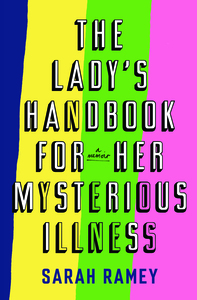You need to sign in or sign up before continuing.
Take a photo of a barcode or cover
This book will make you angry but it will make you hopeful. Sarah Ramey is a superstar, fighting for herself and everyone who doesn’t feel heard in our broken medical system.
Reading this, I was absolutely engrossed. I felt so angry for the author at times (a lot) but it left me feeling hopeful and seen at the same time. The framing and the way she weaves storytelling and greater themes together is masterful. I can already tell I will revisit this book. I want to buy a physical copy so I can dog ear the pages I want to re-visit that inspired me and made me think and question.
Very brave of her to share so many intimate details of her healthcare nightmare. Proof that being white and the daughter of two doctors doesn't give you any real advantage battling mystery illness. She has plenty she could complain about but tone overall is educational and uplifting. The section about mythology and the feminine lost me a bit, but I respect she's chasing her bliss. I loved the humour, lightness, concrete suggestions for healing, and Harry Potter analogies. Must read for anyone living that mystery illness life, I feel seen, and this put some puzzle pieces into place. I unreservedly recommend this book.
#chronicpain #mecfs #longcovid #audiobook
#chronicpain #mecfs #longcovid #audiobook
After a botched treatment for a UTI leaves [a:Sarah Ramey|16210153|Sarah Ramey|https://s.gr-assets.com/assets/nophoto/user/u_50x66-632230dc9882b4352d753eedf9396530.png] in intense, chronic pain, the medical system's inability to diagnose, treat, or help her leads her to a downward spiral of treatments, side effects, and debilitating illness. In this chronicle of her decade-long search for relief, Ramey paints a disastrous portrait of the modern, symptom-focused American medical system. Her story is fascinating, but I would not recommend this memoir unequivocally, at least without a tighter edit: Ramey's writing is unconventional and sometimes overly precious; the book is way too long, often whirling into repetitive tangents; and the author's largely irrelevant feminist theories, presented to inspire other women in similar predicaments, only detract from the important systemic failures Ramey aims to expose.
DNF.
This first part of this book was fascinating and I was really into it, but I got bored with the second half and couldn’t get past chapter 21. It felt repetitive and drawn out. While women’s health, chronic illness and the healthcare system for women are certainly worthy topics, this particular story could have been half the length and been fantastic. It was also a little difficult getting past the incredible privilege the writer has to have come from a wealthy family in which she is able to fly all over the country to the best hospitals and treatment centers in order to try to get the help she needs. That is just not the case for most women in America, and I felt like it could have been addressed further.
This first part of this book was fascinating and I was really into it, but I got bored with the second half and couldn’t get past chapter 21. It felt repetitive and drawn out. While women’s health, chronic illness and the healthcare system for women are certainly worthy topics, this particular story could have been half the length and been fantastic. It was also a little difficult getting past the incredible privilege the writer has to have come from a wealthy family in which she is able to fly all over the country to the best hospitals and treatment centers in order to try to get the help she needs. That is just not the case for most women in America, and I felt like it could have been addressed further.
After starting this book extremely hopeful of it representation of the chronic illness community, I am dnfing based on the transphobia.
This book could have really used more proactive editing, or maybe a manuscript coach (or co-writer?) to keep it from going off the rails. It was helpful and informative in many ways, and dramatically limited by the author's privilege (and consequently limited/sheltered view of the world) in others. And the line between actual research and lived/anecdotal experience was extremely blurred. I am a big believer in the inherent value of a person's story, so I'm not complaining that there was too much story and not enough research. What I am complaining about is long sections in which it was not clear to the reader where the assertions were coming from (the author's brainstorming and conjecturing or actual evidence-based research?). As a middle-class white woman, I felt pretty sure I was the precise target audience of this book...but I was uncomfortably aware as I read it how cringe-worthy and probably even angering some of the assertions and suggestions would be for anyone even a small step outside my demographic.
This is a terrific book. I was a bit daunted by the length at first, but the author’s writing makes it a page turner. I gave it 5 stars as it made me change my perspective on my own chronic illness and situation in general. It’s not just for those with chronic illness though, it’s for anyone pondering the question if how we (our society) are living our lives might be having an impact on our health and our world - kind of relevant these days I think. The author gives us her well thought out perspective, through her own journey, on this.
There were parts of this book that were an absolute 5 and other parts that were more like a 2. I settled on 4 because the message is powerful though the method to get there meanders and I suspect some may give up before getting there. I am a #WOMItoo. And the message of how women are treated by the medical profession, both by men and women in it, is disgusting. To this day I know men, even close to me, who squirm at the talk of a menstrual cycle let alone pelvic pain or migraine headaches, peri menopausal or thyroid issues or actually anything even remotely perceived as a “female” health issue. Is this their fault? No. Our society has conditioned us all to be that way. But our medical profession has somehow become the biggest proponent of this behavior. Telling women “that is normal” when in fact these things are NOT normal. I would much rather hear “we just don’t know” then to be explained away that these awful symptoms are not normal. They are now considered normal because we aren’t listened to. Because these things only kill our spirits and we are somehow still walking around alive. This book points to all of this loud and clear. While I had to skip some of the details...I think that some will appreciate seeing them to not feel alone - and they do back up her point. And while I personally didn’t find luck in Functional medicine and don’t think it is the end all answer I think it is an avenue worth exploring. I also think JERF eating is important and overlooked as a root cause of health issues in our society. I sometimes wonder if we did have a Medicare for all type system and it became more about finding health instead of making profit if we wouldn’t consider diet and non pharmaceutical much higher priority. Wouldn’t we be looking to keep costs low since it no longer is about insurance companies making money?I have found homeopathy- though only the practical kind offered by Joette Calabrese- to be most helpful, it is addressing whole body issues by symptoms. I think the less clear message Of the book was to find a practitioner who LISTENS and doesn’t think you are normal or just need a mental health evaluation. They are out there in many modalities. And we as a society need to push the #WOMItoo just as hard as the gay population did for AIDS. These issues need and deserve our attention. Our society deserves having our women functioning on all cylinders so they can nurture comfort and take care of us especially in a crises like we fact today. Certainly read it to the end. Skip some of the details if it gets to be too much. But read it!
I'm not sure what I just read. A ranting manifesto about the poor author's 14 year battle with an undiagnosed illness. Sprinkled with musings on everything from feminism to the hero's journey to the healing power of social connection to I don't know what. Ramsey thoroughly researched anything and everything that might help her in her health quest. Went to countless doctors and endured lots of medical interventions that usually made everything worse. Her conclusion that the medical establishment needs to Listen to Women is sound. As is all her revelations about eating healthy, getting good sleep, reducing stress, etc. I'm happy to note that after over 300 pages, a consensus on what was happening and how to treat it was met. But, my God, her ranting and writing was so distracting. I get it. Women are not treated well by the medical field. They are not believed. I've had my experiences too and am very skeptical of any doctor. But this book could have used serious editing and still get its point across. I only was able to finish it because once I was hip to her style, I did some generous skimming over the rants. Plus I wanted to see if there was a resolution, which there mostly was. I would not recommend this book.






